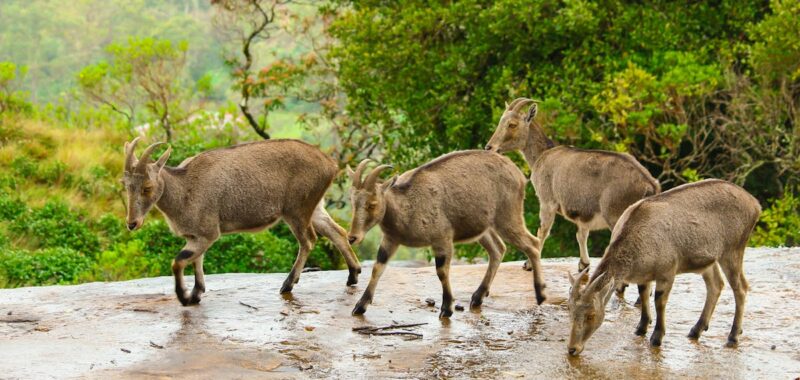India’s Travel Operators For Tigers India Wildlife Association (TOFTigers) has urged the government to promote nature tourism as a tool to protect wildlife. The association cited studies that have shown that over the past 25 years, 10% of the Earth’s wilderness has been lost.
The wildlife tourism market in India stood at $11.2 billion in 2023, according to business consulting firm Grand View Research . This is expected to grow at a rate of nearly 10% a year from 2024 to 2030, reaching $21.7 billion at the end of the decade.
In its call for re-wilding and conservation of wildlife and sustainable tourism, Vishal Singh, co-founder and director of TOFTiger, said that nature tourism can help support wildlife conservation, rural communities, and re-wilding efforts. “By opening these areas to well-managed, sustainable tourism practices, we can unlock immense ecological and economic value,” he said.
According to International Union for Conservation of Nature (IUCN), India accounts for 7-8% of all recorded species. It also has four of the world’s 36 recognized biodiversity hotspots.
Efforts in India: Efforts to promote eco-tourism are gaining traction across India. Prakhar Misra, additional director of Uttar Pradesh Eco-Tourism Development Board, highlighted initiatives such as curated eco-site tours, youth sensitization programs, and efforts to preserve heritage sites.
In Madhya Pradesh, which is home to 785 tigers across nine tiger reserves, 11 national parks, 24 wildlife sanctuaries, and three biosphere reserves, eco-friendly initiatives are thriving. Sheo Shekhar Shukla, principal secretary of the tourism and culture department, noted the promotion of conservation-focused homestays and programs empowering local communities.
In 2022, India developed a national strategy for eco-tourism to promote sustainable tourism practices. The policy prioritizes conserving natural resources, protecting biodiversity, and supporting local communities’ livelihoods through eco-friendly tourism initiatives. It also looks to create awareness about conservation among tourists and stakeholders, while looking at developing eco-friendly infrastructure and activities in sensitive areas.
Panna Tiger Reserve in Madhya Pradesh saw its tiger population wiped out in 2009, causing a tourism slump. After tiger reintroduction, tourism gradually rebounded, with 91,000 visitors generating INR 11.8 million ($139,060) in 2018-19. Numbers dipped during the pandemic but recovered to 79,000 visitors and INR 12.5 million ($147,000) in 2020-21. By mid-2024, over 218,000 tourists had visited the park’s core area.
Hilton’s Expansion Playbook
Hilton has reached its target of 1,000 operational hotels in the Asia Pacific region a year ahead of its schedule. The hotel chain’s strategy revolves around tailoring offerings to meet regional demands. And India is a part of its plans to grow in this region.
Hilton recently entered into a “strategic licensing agreement” with Olive by Embassy to develop 150 Spark by Hilton hotels, marking its foray into the premium economy segment.
Speaking to Skift, Clarence Tan, Hilton’s senior vice president of development for Asia Pacific, said that India provides a lot of growth potential for the hotel chain. “The world’s largest population, a rising middle class, and the huge infrastructural investments in the country on roads, airlines, airports, tech centers and then of course, the market is undersupplied in terms of hotel rooms.” Hilton aims to grow its presence in India to 75 hotels in the coming years.
Air India Express MD Expects Merger to Drive Profitability
The recently-completed merger of Air India Express with AIX Connect will fast-track the company’s profitability, Aloke Singh, managing director of Air India Express, said in an interview to Indian news agency PTI. “The objective is to build a robust, scalable network that supports long-term growth,” he said.
He added that profitability will be achieved through scale, cost optimization, and better utilization of assets. In the 2022-23 fiscal year, the airline had reported a profit of INR 1.2 billion ($13.8 million). The following year, it reported a loss of INR 1.63 billion ($19.2 million) even as its income increased 33% year-on-year.
Within the next two to three years, the airline plans to double its fleet to 175 aircraft and expand its presence in the domestic and international markets.
Cygnett Launches New Luxury Brand ‘Anamore’
Cygnett Hotels & Resorts has launched a luxury brand called Anamore, a pivot from its existing portfolio of budget and midscale properties. The first property under the brand is expected to open by the end of next year in Pushkar. By March 2027, Cygnett aims to add over 1,200 rooms under the brand, with hotels slated to open in Uttarakhand ‘s Srinagar and Karjat, Khalapur, and Murud in Maharashtra.
The hotel chain currently has a portfolio of 45 hotels with more than 3,600 keys. It plans to add 1,000 rooms to its inventory every year over the next five years, expanding to 100 properties with a total of about 9,000 rooms by 2029.
Noida International Airport Conducts Validation Flight
Ahead of its opening in 2025, the upcoming Noida International Airport successfully completed its validation flight on Monday. This is a key part of the aerodrome licensing process.
The validation flight was conducted by budget airline IndiGo, which is the launch carrier for the airport. During the flight, the airport’s approach procedures, accuracy and functionality of its navigational aids, and air traffic systems were confirmed.
The airport will now complete the documentation for the aerodrome certification and submit it to the Directorate General of Civil Aviation (DGCA).
Radisson Debuts Park Inn & Suites by Radisson Brand in Thrissur
Radisson Hotel Group has opened Park Inn & Suites by Radisson Thrissur East Fort. The 66-room hotel marks the brand’s debut in Thrissur, Kerala.
The hotel falls under Radisson’s partnership with Treebo Hospitality Ventures. Under the collaboration, the two hospitality groups have set a target to open 150 hotels under the Park Inn & Suites by Radisson brand by 2032.
The brand, which was launched in 2022, focuses on Tier-2 to Tier-5 cities in India with an aim to cater to the growing middle class travelers.

